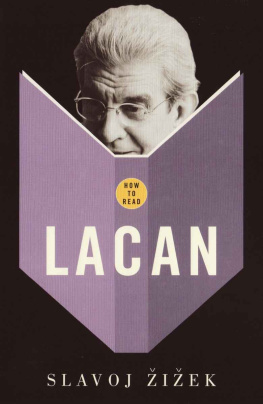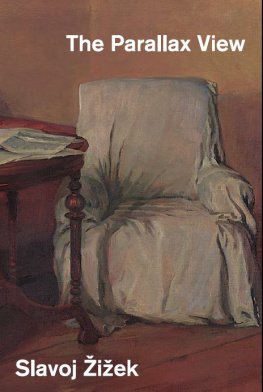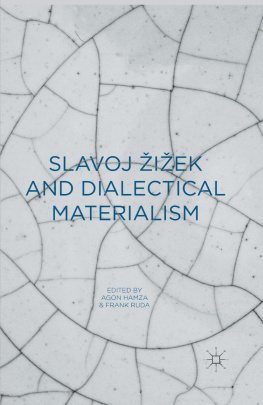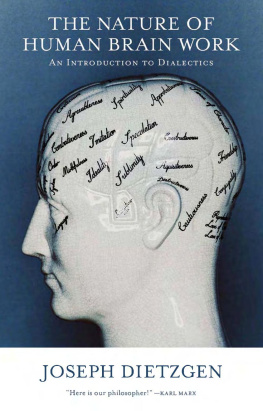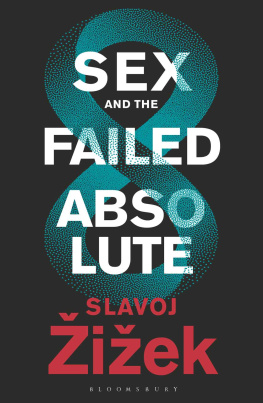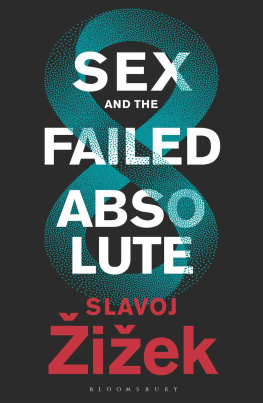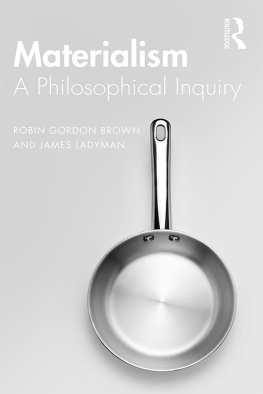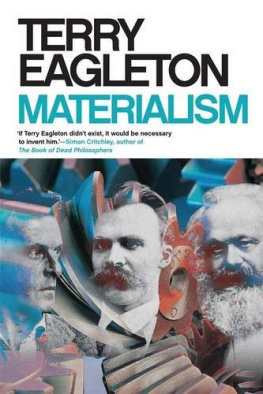iek, Slavoj.
Absolute recoil : towards a new foundation of dialectical materialism / Slavoj iek.
1. Dialectical materialism. 2. Hegel, Georg Wilhelm Friedrich, 17701831. I. Title.
Contents
Introduction: Certainly There Is a Bone Here
Materialism, old and newAgainst the deflated HegelThe disparityDialectical historicity
Towards a Materialist Theory of Subjectivity
Kant avec AlthusserThe forced choice of freedomThe anticipatory subject
From Kant to Hegel
The ontic questionThe Hegelian moveThe framed frame
The Wound
Getting stuckThe FallThe anti-colonial recoilThe violence of the beginningThe absolute recoil
INTERLUDE I STAGING FEMININE HYSTERIA
Art and the unconsciousThe impasses of atonalityThe dream-thought of Erwartung
Evental Truth, Evental Sex
The three Events of philosophyLa vrit surgit de la mpriseThe circle of becomingDas Unbehagen in der Sexualitt
Being, Not-Knowing, Absolute Knowing
Knowing, death, ignorance, sacrificeQuantum knowingIs Absolute Knowing Hegels docta ignorantia?
Gods Twisted Identity
Gods of the RealThe bond of the WordHistoricizing GodGod in struggle with HimselfThe prosthetic God
INTERLUDE II LUBITSCH, THE POET OF CYNICAL WISDOM?
The three whites and the two blacksThe lesson of playing golf on the shores of GalileeThe Fall, againWhy we should marry a dollWhere, exactly, is the trouble in paradise?Cynical wisdom
Varieties of the Negation of Negation
Suicide as the act of assuming the impossible/real of freedomThe two butterfliesBetween the two impossibilitiesThe downward-synthesisAgainst the Hlderlin-paradigm
There Is a Non-Relationship
Two films on subjectivityThe necessity of a chimney sweepDesire, Drive, Deleuze, LacanThe Absolute
From Here to Den
Between den and clinamenDen and the OneFrom ISR to a, S(), $Sinthome, objet a, $
Introduction:
Certainly There Is a Bone Here
In of his Materialism and Empirio-Criticism, invoking Engels claim that materialism has to change its form with each new scientific discovery, Lenin applies the point to Engels himself:
Engels says explicitly that with each epoch making discovery even in the sphere of natural science [not to speak of the history of mankind], materialism has to change its form. Hence, a revision of the form of Engels materialism, a revision of his natural-philosophical propositions, is not only not revisionism, in the accepted meaning of the term, but, on the contrary, is demanded by Marxism.
Today, in turn, we should apply this motto to Lenin himself: if his Materialism and Empirio-Criticism clearly failed the task of raising philosophical materialism to the level of relativity theory and quantum physics, neither can it help us grasp other breakthroughs such as Freudian psychoanalysis, not to mention the failures of twentieth-century communism. The present book is an attempt to contribute to this task by way of proposing a new foundation for dialectical materialism. We should read the term dialectics in the Greek sense of dialektika (like semeiotika or politika): not as a universal notion, but as dialectical [semiotic, political] matters, as an inconsistent (non-All) mixture. Which is why this book contains chapters innot ondialectical materialism: dialectical materialism is not the books topic; it is, rather, practiced within these pages.
The books title refers to the expression absoluter Gegenstoss, which Hegel uses only once, but at a crucial point in his logic of reflection, to designate the speculative coincidence of opposites in the movement by which a thing emerges out of its own loss. The most concise poetic formula of absolute recoil was provided by Shakespeare (no surprise here), in his uncanny Troilus and Cressida (Act 5, Scene 2):
O madness of discourse,
That cause sets up with and against itself!
Bi-fold authority! where reason can revolt
Without perdition, and loss assume all reason
Without revolt.
In the context of the play, these lines refer to Troilus self-contradicting argumentation when he learns of Cressidas infidelity: he enumerates arguments for and against what he wants to demonstrate; his reasoning rebels against its own line of argument without seeming to undo itself; and his unreasonableness assumes the appearance of rationality without seeming to contradict itself. A cause that acts against itself, a reason that coincides with the revolt (against itself) Although these lines refer to feminine inconsistency, they can also be taken as a comment on the secret alliance between the dignity of the Law and its obscene transgression. Recall Shakespeares standard procedure, in his royal chronicles, of supplementing the big royal scenes staged in a dignified way with scenes figuring common people who introduce a comic perspective. In the royal chronicles, these comic interludes strengthen the noble scenes by way of contrast; in Troilus, however, everyone, even the noblest of warriors, is contaminated by the ridiculing perspective, which invites us to see every character as either blind and pathetic or as involved in ruthless intrigues.
The operator of this de-tragicization, the single agent whose interventions systematically undermine tragic pathos, is Ulysses. This may sound surprising in view of Ulysses first intervention, at the war council in Act 1, when the Greek (or Grecian, as Shakespeare put it in what now may be called Bush mode) generals try to account for their failure to occupy and destroy Troy after eight years of fighting. Ulysses takes a traditional old values position, locating the cause of the Greeks failure in their neglect of the centralized hierarchical order in which every individual has their proper place. What, then, causes this disintegration which leads to the democratic horror of everyone participating in power? Later in the play (Act 3, Scene 3), when Ulysses tries to convince Achilles to rejoin the battle, he mobilizes the metaphor of time as a destructive force that gradually undermines the natural hierarchical order: with the passing years, your heroic deeds will soon be forgotten, your reputation will be eclipsed by the new heroesso if you want your warrior glory to continue to shine, you must rejoin the battle:



